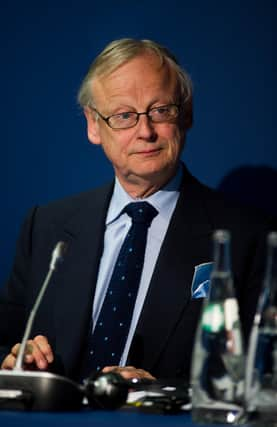Farming: Call for ‘tools, not targets’ to tackle climate change


And a united call for ‘tools rather than targets’ emerged at yesterday’s Scottish Land and Estates annual conference which focused on this major global emergency.
Giving the key note address at the conference, Lord Deben, who currently chairs the UK’s Committee on Climate Change – but who is perhaps better known in farming circles as former Conservative minister, John Selwyn Gummer – said that Scotland had a special place in the battle against climate change, as did land owners and land managers if the UK was going to meet its net zero targets.
Advertisement
Hide AdAdvertisement
Hide AdBut he said that to achieve any substantial reduction in greenhouse gas emissions a common measure by which to judge success – for both emission reductions and carbon sequestration – had to be available.
And while he admitted that the science behind this area might not yet be perfect, he said it was a simple lack of political will which was stopping the introduction of an officially accepted form of measurement:
“The Government must simply knuckle down and sort this out – and if science provides evidence of better metrics in the future, then the system can be tweaked as we progress.”
He said that such a measure was needed to assess the success of post-CAP farm policy review which would focus on climate issues, adding that it was also important that farmers got sufficient notice to prepare their systems for major changes in policy.
And, on the just transition to a more climate friendly support system Lord Deben struck out at the proposed trade deal with Australia which could see considerable amounts of food and farm produce imported into the UK: “We just can’t have a system whereby we import food from elsewhere which does not meet our standards – it’s simply not acceptable to export our emissions.
“Our farmers and land managers can only do what’s necessary if they’re not undermined elsewhere and the unacceptable deal with Australia – a country where the prime minister is happy to do absolutely nothing about climate change – will undermine our own farmers while also undermining the environment.”
And the theme of tools rather than targets was also taken up by SLE chair, Mark Tennant who said rural businesses were already delivering in reducing emissions and storing carbon – but there was a need to go further and faster.
He said that as well as proper metrics, there was a need for an established carbon market and pricing structure:
Advertisement
Hide AdAdvertisement
Hide Ad“We need a collective approach – working hand in hand at a landscape level across regions and nations to deliver impactful measures that will sustain our planet for future generations.”
Leading climate scientist, Sir Dieter Helm, Professor of Economic Policy, University of Oxford, said that it wasn’t enough for big corporations to greenwash themselves by purchasing carbon offset credits in the same manner as the nobility had purchased redemption from the church in mediaeval times.
Comments
Want to join the conversation? Please or to comment on this article.